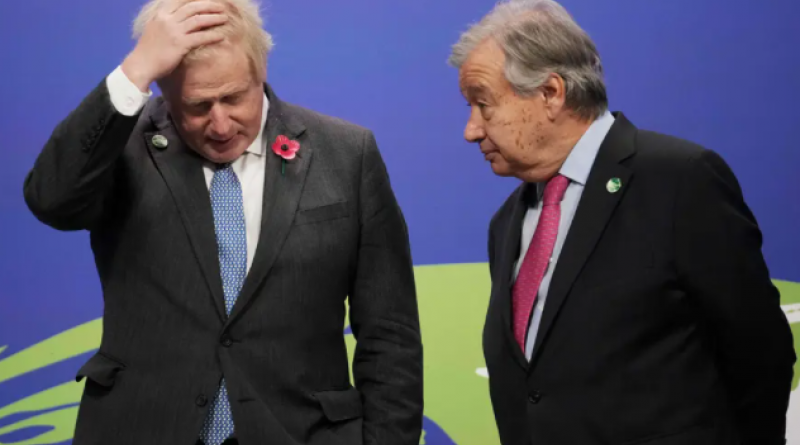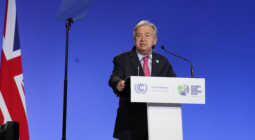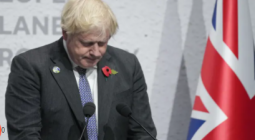Op - No wonder Boris Johnson is saying it’s ‘touch and go’ for a successful Cop26

International diplomacy’ ahead of Cop26 has consisted of lecturing other countries about the need for ambition and action, while at home the government takes almost no action at all
In the run-up to the Paris climate summit in 2015, the French government went into overdrive to ensure Cop21 was a success.
The foreign minister made 11 visits to China in the three years leading up to the summit. The French diplomatic corps hosted 900 climate-related meetings with ministers, companies and NGOs, and four roving ambassadors made sure no country was left out in the pre-summit negotiations.
They were “amazing”, said Christiana Figueres, the then head of the UN framework convention on climate change.
It was that kind of effort and commitment that led to the Paris Agreement in December 2015. The comparison with the UK’s efforts couldn’t be more revealing. The lack of vision, political leadership and groundwork from this government is shameful.
Yes, the preparations have taken place during a global pandemic that has added to the challenges. But, apart from the overseas visits of Cop26 president Alok Sharma, the absence of any meaningful climate diplomacy by government ministers and the prime minister in particular has been shocking.
Two months ago, I asked foreign office ministers what meetings they’d had where Cop26 was the focus of discussion. They sent me a spreadsheet that hadn’t been updated since 2020. It then transpired there were no dedicated foreign office meetings in the second half of last year, and the prime minister has had only one Cop26 meeting this year. One of the four he had in 2020 was with BP.
Boris Johnson’s “international diplomacy” ahead of Cop26 has consisted of lecturing other countries about the need for ambition and action, while at home his government takes almost no action at all or, worse, undermines the chances of success.
While Alok Sharma is calling on other countries to increase climate finance to poorer countries, which he has rightly called “a matter of trust”, his government cuts overseas aid and uses part of the money to claim it is meeting climate finance commitments. That doesn’t fool anyone, least of all the global south.
We have just had a budget and spending review from the chancellor where the words climate and nature were not even mentioned in his speech to MPs. This was the last big chance before Cop26 for the government to show it is serious about tackling the climate and nature crises – and it blew it.
No wonder Johnson is now talking down the prospects of a successful summit, saying it is “touch and go”.
What makes this worse is that there is a clear mandate for progress: there’s huge public support for bold and ambitious action, and the extreme weather events of the past two years have shown the urgency of cutting emissions – not by 2050 but in the next decade.
As the IPCC report this summer made clear, we are in danger of hitting 1.5C of heating in the near term and certainly well before mid-century if the world fails to cut emissions fast. The latest emissions gap report from the UN Environment Programme says the new, supposedly more ambitious climate pledges that countries have come up with ahead of Cop26 actually put the world on track for an average global temperature rise of 2.7C by the end of this century – and that is if the pledges are met.
If we are to keep 1.5C alive, one of the key objectives of the summit, global emissions need at least to halve this decade. And the UK along with other advanced economies, which in Johnson’s own words have “reaped the benefits of untrammelled pollution for generations, often at the expense of developing countries”, must move even faster.
This isn’t just a matter of global climate leadership, which the prime minister so often boasts about, it is a question of climate justice. Despite the current finger-pointing at China and India, the fact is that Europe and North America are overwhelmingly responsible for the carbon emissions pumped into the atmosphere over the past 150 years. The principle of “polluter pays” means the richest countries need to meet the cost of that damage.
Yet the pledge of $100bn a year in climate finance by 2020, first made in 2009 and repeated at subsequent climate summits, has not been honoured. The breakdown in trust that this has created in the global south has made the challenge of reaching an agreement even more difficult.
To keep up to speed with all the latest opinions and comment sign up to our free weekly Voices newsletter by clicking here
The Cop26 agenda is huge, covering so many vital issues: keeping live the hope of 1.5C, the phase-out of coal, progress on loss and damage for countries whose economies are already being devastated by climate change, deforestation, the rights of indigenous peoples, the rules governing carbon markets and more. None of them have seen sufficient progress.
This summit is our best chance of avoiding climate breakdown. There is always the chance that, at the eleventh hour, world leaders will show that it is possible to pull together in the face of a crisis that threatens us all, that they will not only agree to much more ambitious emissions cuts, they will also make them with far greater urgency.
But whatever happens, failure is not the end of the fight against climate change. It just makes the challenge more difficult. For all of us who are determined that our planet has a healthy future well beyond our lifetimes, the campaign will continue.
1 November 2021
INDEPENDENT




